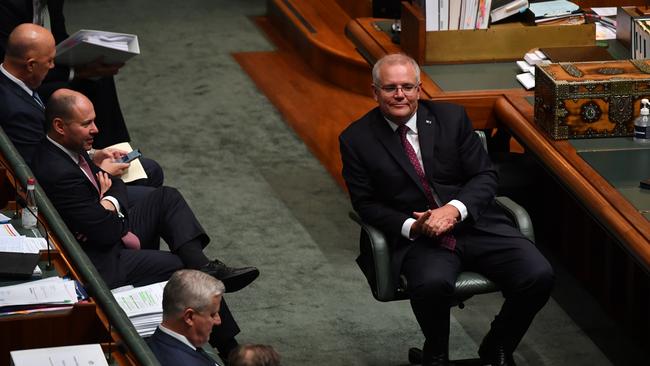Not all men behave badly, but some things can change in parliament
The ‘toxic culture’ trope has impugned the reputation of every male in Canberra, including journalists.

Having lived in Canberra for over 30 years with my life almost governed by the parliamentary calendar, and observing the comings and goings, I can assess these suggestions of reform.
The overarching fact to remember is that most of the stories of unacceptable behaviour in the capital occur in parliamentary sitting periods. However, parliamentarians are not in Canberra for most of the year. They are in their electorates. This year, parliament will only sit for 67 days out of 365. Ministers spend more time in Canberra than others and it is hard on families. It is the price one pays for political office.
However, when parliament sits perhaps working hours could be more “normal”? It is basically 9.30am to 8pm but that varies. On Thursday everyone leaves at 5, so they can fly home. Late night sittings happen, but they are rare. Senate estimates can go on until late into the night. That is a symptom of just getting the work done. Late nights are a problem of all professional work places.
Then there is the drinking “culture”. The real drinking mostly takes place outside parliament, as was the case with Higgins. The stories of parliamentarians and staffers whooping it up in the corridors are a blast from the past. There was a very popular bar in the old Parliament House and a bar was built in the new Parliament House. However, it was closed down and, guess what? It was turned into a child care centre.
Suggesting that parliamentarians and staff should be breathalysed is insulting. Who should do it and what are the limits .04, .02? zero? Parliament House is a public building. It is a venue for all sorts of gatherings big and small where alcohol is served. There are business meetings, book launches, and all sorts of public interest groups use it for meetings. The general public flocks to it. It is the biggest tourist attraction in Canberra.
As for reforming Question Time and making it more like the British parliament, forget about it. It has been tried by Paul Keating. There was general uproar, and he was attacked as a part time prime minister. The public will not accept that the PM should not be in the chamber at all times because Question Time goes to the very heart of Australian adversarial politics. The public regards Question Time as “democracy in action”. The problem in Australia of rigidity and confrontation in parliament is the discipline of party lines. This is particularly the case in the Labor Party, where crossing of the floor means instant expulsion. This is the main problem in the senate. Senators are not voting according to states’ interests as the senate was designed, but according to party lines.
There is no doubt that clear lines of behaviour in the parliament in and out of the chamber need to be structurally reinforced and, after the Higgins affair, there are moves to do this. However, removing legal privilege from parliamentarians’ offices is pointless and dangerous. It is there to prevent harassment from the investigative arms of government. There is no suggestion that parliamentary privilege has ever been used to cover up criminality, despite murky suggestions during the Higgins affair.
As for the “bonking ban”, as Julie Bishop said, it only leaves MPs and staffers more open to pursuit by sensationalist media. Many young MPs with families aren’t one bit interested in sexual shenanigans, nor like-minded older ones. You might remember that there were PMs of much less probity than the current crop 40 years ago, and the “tone” of senior parliamentarians’ private lives has probably improved.
The “toxic culture” trope has impugned the reputation of every male, including journalists. However, being accused of rumour mongering and drinking with parliamentarians is a view from the heights of commentariat, not everyday journalism.
The longest serving journalists of the press gallery are people with ethics and high professional standards. That is how you get to stay in the press gallery for decades, and it is the nature of political journalism to form relationships with politicians and those who work for them. These journalists work all hours and traipse all over the world with prime ministers – not to mention getting stuck in Washington during 9/11, dodging bombs in London and crazed Islamists in Islamabad. It is a difficult life. How do I know? I must confess, I have had a sexual relationship with the longest continuous serving member of the press gallery. He is my husband.




With the emergence of Brittany Higgins as an activist, the workplace culture of the parliament of Australia and, by extension, the reputations of those who work there, has been discredited with the term “toxic culture”. It conjures a Hogarthian image of lordly drunken parliamentarians leering at women. The whole affair has led to a series of calls for reform that the Prime Minister should personally institute, some of which might seem reasonable.